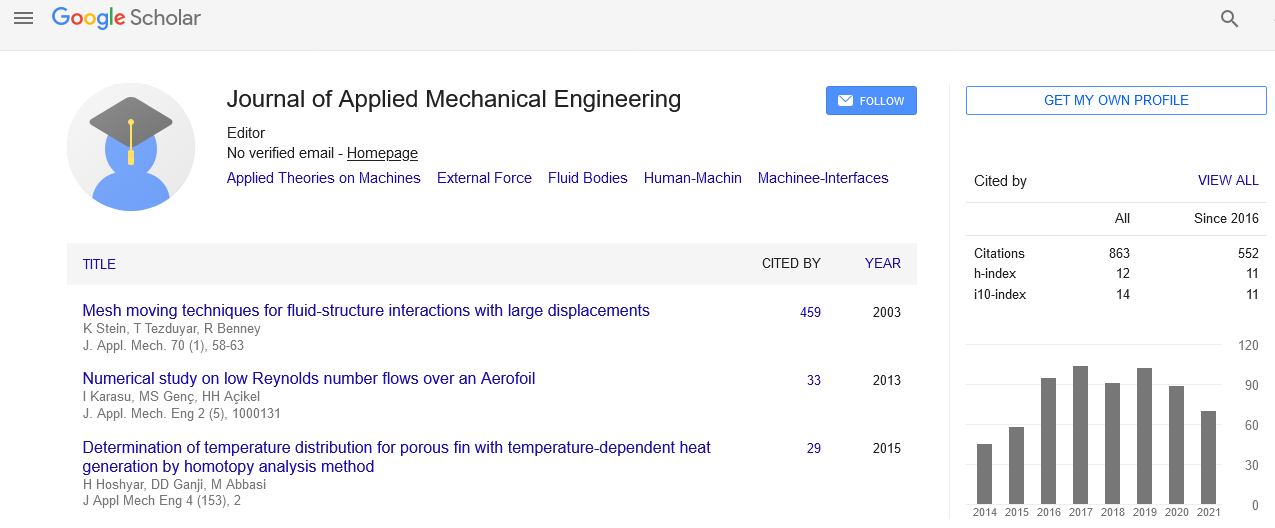Indexed In
- Genamics JournalSeek
- JournalTOCs
- CiteFactor
- RefSeek
- Hamdard University
- EBSCO A-Z
- OCLC- WorldCat
- Publons
- Google Scholar
Useful Links
Share This Page
Journal Flyer

Open Access Journals
- Agri and Aquaculture
- Biochemistry
- Bioinformatics & Systems Biology
- Business & Management
- Chemistry
- Clinical Sciences
- Engineering
- Food & Nutrition
- General Science
- Genetics & Molecular Biology
- Immunology & Microbiology
- Medical Sciences
- Neuroscience & Psychology
- Nursing & Health Care
- Pharmaceutical Sciences
Navigation of robot on another planet using TVS with variable scanning step by electromechanical transmission in laser positioning system
International Conference and Exhibition on Mechanical & Aerospace Engineering
September 30-October 02, 2013 Hilton San Antonio Airport, TX, USA
O. Yu. Sergiyenko
Scientific Tracks Abstracts: J Appl Mech Eng
Abstract:
Nowadays, navigation has many technologies, for example GPS, Method for vision-based cooperative navigation aiding, Guided robots (by magnets line, colored line, etc.). Many technologies exist for self-location, such as GSM, CDMA, Cell Identity, etc., i.e. wireless location systems. GPS is based on distance to satellites, camera guided robots are basing on typical images recognition; like other mentioned technologies all them have a strong disadvantage for the mission on another planet: they need additional artificial units pre-installation. Robot navigation in a different planet cannot work with reference artificial satellite. Design of Technical Vision System (TVS) with dynamic triangulation to scan any scene is required for such application. However, such scanners still has unique speed, and obviously robot navigation requires a large time and amount of calculation which is not possible to execute in real time in other planet navigation on unknown terrain. From the above discussion emerges the task of the synthesis of adaptive mini-electromechanical transmission for to change speed of mechanical scanning, to act in uncertain environments to find harmful obstacles in a shortest time with enough information. The 101 scenes have been simulated with irregular objects in every scene, aiming to develop an algorithmic definition of the optimal scanning angles, in meaning to scan faster without looses of information about obstacles in scene. According to simulation data were selected three optimal angles to use for scanning slow (high definition), medium and fast (low quality). The scanning optimal angles will be using to apply in mini-electromechanical transmission.
Biography :
O. Yu. Sergiyenko was received the Ph.D. degree in Kharkiv National Polytechnic University on ?Tools and methods of non-destructive control? in 1997. He has been editor of 1 book, written 6 book chapters, 57 papers, holds 2 patents of Ukraine and Mexico respectively. He represented in several International Congresses of IEEE, ICROS, SICE, IMEKO in USA, England, Japan, Italy, Ukraine, and Mexico. He is reviewer in several international journals. On 2004 was invited by Engineering Institute of Universidad Autonoma de Baja California for researcher position, he is currently Head of Applied Physics Department and director of Master?s and Doctorate thesis.

